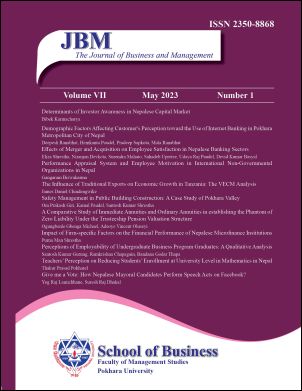Perceptions of Employability of Undergraduate Business Program Graduates: A Qualitative Analysis
DOI:
https://doi.org/10.3126/jbm.v7i01.54557Keywords:
Business students, employability, perception, qualitative analysisAbstract
Background: Students' perspective on graduate employability is an essential aspect to consider as they are the primary stakeholders of higher education institutions. Therefore, exploring graduates' perspectives on their employability and considering their opinions when designing policies and programs to improve graduate employability is crucial. However, little attention has been paid to graduates' perspectives on their employability.
Objectives: This paper explored graduates' perceptions of employability, the labour market, and their views on academic credentials and employability skills in obtaining and retaining employment. The paper also examined the role of business schools in enhancing employability and how universities have prepared graduates to enter the labour market in the context of the human capital approach.
Methods: The study adopted a qualitative approach using semi-structured interviews with a small sample of 38 undergraduate students from two different business programs who graduated from the constituent college of Pokhara university in 2019 and 2021 using purposive sampling. The interviews were designed to elicit in-depth responses from the participants and to allow them to share their experiences and insights. The study used the thematic analysis approach to analyze the data, which involved identifying patterns and themes within the data. The transcripts of the interviews were carefully reviewed and analyzed, and themes were generated based on the recurring patterns and ideas expressed by the participants.
Results: The thematic analysis demonstrated that graduates understood employability as becoming employable with the potential of employability skills. Graduates viewed possessing academic credentials as one of the key benefits ofbecoming employable in the competitive and congested graduate labour market. The study further illustrated that employers expect both discipline-specific knowledge and soft skills from graduates. The data on the role of business schools in enhancing employability suggested that although many graduates felt that business schools could provide theoretical knowledge, the schools need to pay more attention to practical-based knowledge, especially soft skills.
Conclusion: The study findings have provided insights into how recent graduates comprehend employability, view the current labour market and position their academic credentials in employability. The analysis has further demonstrated that students increasingly view their employability as the relative positional competition for labour market resources, which appears to have a bearing on how they perceive the role of credentials in their employability. The findings have further shown that employers expect both sides of graduate potential: strong academic credentials and employability skills. Therefore, graduates increasingly see the need to develop broader employability, which incorporates building strong academic credentials and employability skills and competencies outside the formal learning context. The study findings have implications for business schools, policymakers and researchers within the broader discourse of the knowledge-driven economy.
Downloads
Downloads
Published
How to Cite
Issue
Section
License
Copyright © the School of Business. All rights reserved. No part of this volume may be reproduced or utilized in any form or by any means, electronic or mechanical, including photocopying, recording, or by and information storage and retrieval system, without permission in writing from the publisher.




